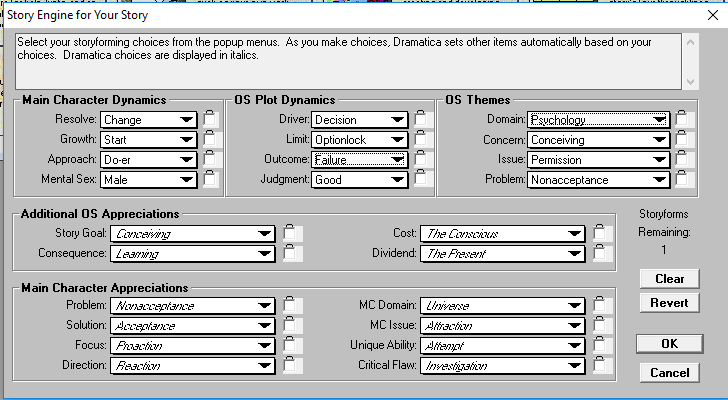I’ll agree he got what he wanted, but I don’t agree that it was how he wanted it. Throughout the movie, Walt is certainly acting in service of getting the movie made, but overall I don’t think that’s enough. I think it’s too specific a goal, like going for the Piston Cup was too specific for Cars. (Edit: Then again, see my argument below…)
In the very same quote you provide, I mention “Making something that everyone can agree on.” Altogether, I still don’t believe that the goal was entirely met, but that may be a symptom of being unable to lock anything down without knowing for certain if there is an Influence Character, or if there is an IC, what perspective they actually hold.
I would say that OS is related to the adaptation, but I’m not sure that I can agree that it was about the adaptation. If you’re looking for the subtext of the movie, I’d argue that the goal therein would be to create the movie without intervention from Mrs. Travers, but I still don’t think that’s right, either…
However, if we go strict and determine where the OS story starts, where we “get on the merry-go-round”, as Jim so recently put it, then I would say that would be the scene with the agent talking with Mrs. Travers and convincing her to go to California. The story feels finalized, then, when the premiere is finished.
Per that purely logical explanation, which appears to follow along with your line of thinking, it definitely seems a Success ending. What bothers me about that is how much of a Failure/Good ending it felt…
In any case, in these arguments, I’m strongly considering that this is actually a Desire movie, a lower-left case, which would be horribly, annoyingly pedestrian, but seems more than likely at this point…
OS in Physics (Obtaining - the rights, the movie), MC in Mind (Subconscious - love for her father)
IC in Universe (The Present - living in the present), RS in Psychology (Becoming - developing friendship)
Getting the rights would be the Goal, while the Concern would be about finishing the movie.
This would mark a Growth of Start and Outcome of Success. I’d argue for Decision for Work (Driver) as even though Mrs. Travers goes against the grain, she actually keeps the plot flowing. My argument that she is a Be-er is as previously. I’d be inclined to agree with the idea of a Linear Problem-Solving Style.
I’d even go so far as to say the thematics of the MC Throughline would deal with Closure, or a lack thereof, while the influence is quite noticeable in how Open Walt attempts to keep his environment, sickeningly from Mrs. Travers’s perspective: Mrs. Travers/Mr. Disney vs Pam/Walt.
I’m rather convinced that Mrs. Travers has a Changed Resolve, considering she never would have even considered signing her rights away up front, and she actually both considers and does it at the end.
I see the thematics at play in the OS much more along the lines of Attitude vs Approach, then anything of Self-Interest vs Morality. Now, given the previous choices in this post, that would force the Problem to be under Approach. Thus, we would have an MC and OS shared problem of either Consider or Reconsider.
From those choices, we would get a Focus/Direction pair of Logic and Feeling for the OS and for the IC, and a Focus/Direction pair of Pursuit and Avoid for Mrs. Travers.
Now I’m doing this without the Dramatica application at the moment, but I would seriously love it if plugging in this Storyform produces a Focus of Pursue, and a Direction of Avoid for Mrs. Travers, and especially love it if it produces a Focus of Feeling and Direction of Logic for Disney.
(Edit: I was able to enter things into the Dramatica software.) Interestingly I found this happens:
Given an OS/MC Problem of Consideration with the other above:
- IC Focus = Logic and IC Direction = Feeling
- MC Focus = Avoid and MC Direction = Pursue
Given an OS/MC Problem of Reconsideration with the other choices:
- IC Focus = Feeling and IC Direction = Logic
- MC Focus = Pursue and MC Direction = Avoid
As such, I would now argue for the Problem of Reconsideration.
In shorter terms, I am now arguing for the full storyform posted below after the thoughtful discussion that has happened in this thread thus far:
- MC Resolve - Changed
- MC Growth - Start
- MC Approach - Be-er
- MC PSS - Linear
- Story Driver - Decision
- Story Limit - Optionlock
- Story Outcome - Success
- Story Judgement - Good
- OS Domain - Physics
- OS Concern - Obtaining
- OS Issue - Approach
- OS Problem - Reconsider (was previously Consider)
This Storyform would ignore anything involving the memories, for the most part, and view the story as only involving the making of the Mary Poppins movie. The memories would then have another Storyform, likely different from this one.

 . And I like being challenged, so no problem.
. And I like being challenged, so no problem.
 ), but this cleared it up for me. Her money drying up, the threat of losing her home, and having to go to California is all conflict itself. Sounds like Mind causing Universe conflict!
), but this cleared it up for me. Her money drying up, the threat of losing her home, and having to go to California is all conflict itself. Sounds like Mind causing Universe conflict!